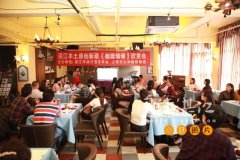The insurance agency hides the downtown cafe and charges five thousand to find a qualified investor.

According to Dong Mi of the listed company, the reporter easily found one of the layer protection service providers located in Shanghai. Call the other party as a representative of the innovation layer company and briefly understand the specific situation. The other party has a friendly attitude, is skilled in business, answers every question, and warmly welcomes the reporter's proposal to go to the other company for an interview.
The insurance intermediary has the background of filing private equity fund.
On a sunny afternoon, the reporter came to the office of Company A near Shanghai Caobao Road and Everbright International Convention and Exhibition Center. According to the address provided by the other party, the reporter found that the company was actually located in a downtown cafe.
Here, the reporter saw Mr. Li, the chief operating officer of Company A, who had been contacted by telephone. However, Mr Li is not alone in waiting for reporters. He introduced to the reporter a thin and tall man sitting next to him, Mr. Lu. Mr. Lu presented his business card claiming to be the legal manager of the investment products department of Company B (a wholly owned subsidiary of Company A).
After sitting down, the reporter asked why the company was set up in a cafe. Mr. Lu said the cafe is also one of the owner's assets and is also open to the public. Looking around, the reporter did see some guests chatting over coffee. Afterwards, the reporter checked the industrial and commercial registration information of Company B and found that the office of the company is really here.
According to the other party, the first floor of the cafe can be used to entertain visitors and negotiate business, and the next staircase leads to the second floor, which is a reception room and a conference room. The two warmly invited the reporter to visit. Step up, there are more than a dozen nameplates on the walls, all of which are said to be project companies invested by their companies, involving start-ups in O2O domestic laundry, Internet oral clinics, cake baking, Internet finance and other industries. there are also some new third board listing companies. The conference room on the second floor has projectors and booths, which are often used to hold exchange activities and corporate roadshows.
When it comes to the specific business of the company, Mr. Lu is more talkative. He told reporters that the company's main business involves a series of intermediary services such as investment management and consulting, private equity investment, equity transfer, equity pledge, financing docking, and so on. Company B is a wholly owned subsidiary of Company An and a licensed formal private equity institution.
Subsequently, the reporter inquired about the industrial and commercial registration and found that Company B was indeed a subsidiary of Company A. In addition, the reporter also found the registration certificate of the private equity fund manager of Company B on the registration and filing system of private equity fund.
There are 60 accounts you can operate.
To help enterprises meet the "double 50" standard means that these service institutions have enough QFII accounts, which is not easy in the new third board market.
According to the regulations, the new third board QFII includes institutional investors, financial products and natural person investors, and each category of investors has strict screening criteria. For example, institutional investors include legal institutions with registered capital of more than 5 million yuan and partnerships with a total contribution of more than 5 million yuan. At the end of the previous trading day, the market value of securities assets under the name of the natural person investor should be more than 5 million yuan. at the same time, he or she should have more than 2 years of securities investment experience, or have accounting, finance, investment, finance and other related professional background.
"Don't worry about this, our accounts are all qualified investors, otherwise we dare not say to help enterprises protect layers." When asked about the QFII account source, Mr. Lu explained confidently that the company's boss came from a large domestic communications company and made a wide range of friends; coupled with the fact that the company's private equity products were subscribed by many customers, these groups were all high net worth customers. Company A currently has more than 60 QFII accounts to operate. The company has a close relationship with customers and trust each other. These customers are willing to use their own accounts to cooperate with Company An in related operations and charge 20% of the purchase amount in return.
Number of days of manufacturing transaction by transfer of agreement
With a QFII account, how to solve the problem of trading days? The reporter raised another question.
Mr. Li exemplified that if a listed company has a concentrated equity and a small number of shareholders, it is necessary to find them to provide 50 qualified investors. Each account must hold at least one share of the company (note: the new third board stock is 1000 shares), then at least 50, 000 shares need to be traded. These 50,000 shares will be traded "hand in hand" in batches. First try to operate one or two hands, familiar with the trading situation can be carried out many times, increase the amount of operation. After the adjustment, the listed company and the relevant shareholders will buy back the shares in the same way. In this process, the listed company provides specific shareholders to lend shares, cooperate with Company A to operate, and follow up the progress of the transaction at any time.
The reporter is a little hard to believe, but Mr. Li continues to explain to the reporter that due to the restrictions of the trading rules, they basically will not provide layer protection services to the companies that make market transactions. Because of the deal with the market maker, the investors can not achieve the share knock, the price is more market-oriented, and the transaction price and quantity are not easy to control. And after mid-March, they will not take on new layer protection cases, because as of April 30, the transferable date is basically less than 30 days, and the operational risk is too high.
After thinking about it, the reporter found that there are still many unclear details. For example: trading shares need funds, take the above situation as an example, assuming that the current stock price of this listed company is 10 yuan per share, 50, 000 shares need 500000 yuan of capital operation. Where does the money come from? Is it a listed company or an investor? Operate according to this method, assuming that the double 50 standard is not met and the layer protection is not successful, can you still get back the funds or shares you take out?
In the face of a reporter's question, Mr. Li, who has been silent, chimed in, together with Mr. Lu, explaining to the reporter that the funds for buying shares were paid by the account holders themselves, but after the trading transaction, the listed company needs to return the funds used to buy shares immediately or the next trading day. Of course, transaction fees and other costs are less, can be ignored or packaged with service fees.
The reporter immediately questioned that after buying the shares, the funds will be returned to you immediately. For the listed company, there is only a contract in hand. After all, this kind of thing is dishonorable, can not be on the table, if institutions and investors do not abide by the contract, listed companies are not really good for arbitration or litigation, is not the money is gone, the stock is also gone!
"it won't." Mr. Lu said in a very positive tone that the account holders are friends of the boss and corporate customers, have a good relationship, and are all high net worth people. Company B itself is also an equity investor, is a private placement on record, and will not damage its reputation for this share and money, otherwise it will not be able to gain a foothold in the circle in the future.
The reporter said that there is no evidence for empty talk, and there are many people who fail to perform the gambling agreement. Seeing that the reporter repeatedly expressed doubts, Mr. Lu was in a bit of a hurry. "if you say so, we are afraid that you will take advantage of the opportunity to sell your shares and cash out." Can we ask for a little bit of your share? "
Seeing that the reporter still had misgivings, Mr. Lu gave another layer protection plan later. The funds for the purchase of shares in the account may not be returned for the time being, and Company An opens another bank account, and the listed company transfers the amount of funds corresponding to the purchase of shares to the account, and the balance of the account can be seen in real time; once the listed company does not buy back the shares, the funds in the bank account belong to them.
Intermediary commitment: full refund of unsuccessful insurance layer
After listening to two sets of plans, the reporter decided to ask how to charge for the protection layer.
Hearing that the reporter began to ask about the cost, Mr. Li was in high spirits and immediately told the reporter that they had to sign two contracts with companies that needed to protect their layers. One is an information service contract signed with Company A, which charges an information service fee, that is, an intermediary fee. Company A charges a service fee of 50, 000 yuan for every 10 QFII accounts, and this kind of "head fee" can also be taken apart and calculated individually, that is, 5000 yuan each. If you need more qualified investors, you can also give a discount.
The other is to sign an investment management contract with another investment company of Company A, that is, to agree on the trading operation of the loaned shares, the share repurchase afterwards, the raising of funds required by the exchange and its costs, and so on. The specific shareholders of the lent shares signed the contract together as Party C. In addition, for qualified investors who provide accounts, 20% of the total funds used to buy shares will be charged in return.
In the face of a confused reporter, Mr. Li gave another example. For example, a listed company needs 50 qualified investors, each holding 1 share or 1000 shares, and the listed company has to provide a total of 50, 000 shares for trading operations. Assuming that the stock price is 10 yuan per share, the account provided by the intermediary needs to use 500000 yuan to buy shares. For qualified investors who provide accounts, 20% of the total stock purchase funds should be charged, 500000 yuan × 20% = 100000 yuan, and an average of 2000 yuan can be earned by each qualified investor who provides the account. For intermediaries, 50 QFII × 5000 yuan, a total of 250000 yuan of intermediary service fees can be earned. However, Mr. Lu also said that the service charge can be discounted, the specific discount depends on the situation, 250000 yuan, the minimum discount is estimated to be about 180000 yuan.
In terms of the method of payment, Mr. Li claimed that within 1 day after the signing of the contract, the listed company would have to pay 50% of the service fee and the remaining 50% before May 5; within 1 day after the signing of the contract, the listed company would also use 50% of the total stock purchase funds as a deposit, hand it over to the account escrow provided by the intermediary, and pay the remaining 50% within 1 day after the end of the equity transfer. At the end of the security layer, within 7 days after the listed company buys back its shares, the intermediary will return all the deposits; if the listed company's repurchase is delayed, it will also need a daily late fee of 0.1%.
In order to completely allay the reporter's concerns, Mr. Lu said that Company A had signed contracts with more than a dozen listed companies, and at first the other parties were full of doubts, and finally talked to each other a lot and gained mutual trust. At the same time, he also disclosed the name of the relevant companies to the reporter, saying that these companies have started trading operations, and reporters can inquire about the trend of the company's stock price and other information. Finally, Mr. Li gave the reporter a "guarantee". If in the end, due to the reasons of Company A, the listed company is unable to protect the layer successfully, after the list of innovation layers is announced, Company A will refund all shares and service fees.
Important Notice :
前街咖啡 FrontStreet Coffee has moved to new addredd:
FrontStreet Coffee Address: 315,Donghua East Road,GuangZhou
Tel:020 38364473
- Prev

The cafe's mass creation space is included in the United front network.
Cafes, social platforms, and mass creation spaces can all become nodes on the United front work network. Changning District held a new United front work promotion meeting for people from social strata yesterday, and the first three new friends' contact points set up at the meeting chose to be listed in social institutions, which will become a bridge to carry out United front work and serve people from new social strata. Sha Hailin, member of the standing Committee of the Municipal Party Committee and head of the United Front work Department of the Municipal Party Committee.
- Next

The appreciation of Zhanjiang's original song "Coffee Love" was held in Chikan.
On April 25, the appreciation of the new local original song "Coffee Love" was held in the small town of Zhanjiang City. More than 60 people, including leaders of relevant units in Zhanjiang, people of music culture, representatives of corporate culture, representatives of college students, journalists and music lovers, attended the scene to enjoy the new songs.
Related
- Can lightly roasted coffee beans be used to extract espresso? How finely should you grind high-quality coffee beans to make Italian latte?
- What is the difference between the world's top rose summer coffee and Yejia Shefi? What are the flavor characteristics of Yega Shefi coffee and Panama rose summer?
- The ceremony is full! Starbucks starts to cut the ribbon at a complimentary coffee station?!
- A whole Michelin meal?! Lucky launches the new "Small Butter Apple Crispy Latte"
- Three tips for adjusting espresso on rainy days! Quickly find the right water temperature, powder, and grinding ratio for espresso!
- How much hot water does it take to brew hanging ear coffee? How does it taste best? Can hot water from the water dispenser be used to make ear drip coffee?
- What grade does Jamaica Blue Mountain No. 1 coffee belong to and how to drink it better? What is the highest grade of Blue Mountain coffee for coffee aristocrats?
- What are the flavor characteristics of the world-famous coffee Blue Mountain No. 1 Golden Mantelin? What are the characteristics of deep-roasted bitter coffee?
- Can I make coffee a second time in an Italian hand-brewed mocha pot? Why can't coffee be brewed several times like tea leaves?
- Hand-brewed coffee flows with a knife and a tornado. How to brew it? What is the proportion of grinding water and water temperature divided into?

